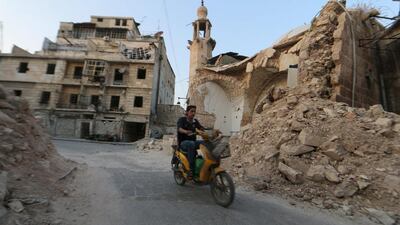The church where I was baptised – the 15th-century Forty Martyrs Armenian Church – was recently bombed in Aleppo. Each time a church, mosque or synagogue is destroyed in Syria or elsewhere, a family like mine also loses a piece of their history, their connection to each other, their community and the world. I would like to tell you the story of my family, Aleppo and that church so it is not lost.
In 1915, my paternal great-grandmother Lucine walked to Aleppo with her newborn son from Kharpert, in what was then the Ottoman Empire. Her husband Bedros had been beheaded. In Aleppo, she raised my grandfather in a refugee camp and she never spoke of what she had endured.
I am a first generation Syrian-Armenian-American actress, writer and producer. I was born in Baltimore, Maryland, to Syrian-born Armenian parents whose marriage was arranged. Their grandparents had created lives in Aleppo. It was here that a community formed again after systematic deportation, massacre and exile from ancestral homelands.
I went to Aleppo for the first time when I was nine months old. I took my first steps there and I was christened in the ancient church in the old quarter of the city.
I spent nearly every summer of my childhood in this ancient city with my mother’s family.
During those summers my sisters and I were privileged to enjoy the recipes and rituals that had been passed down despite the trauma of 1915. A wonderful Armenian tailor would make our dresses for the approaching wedding of an aunt or uncle. We’d be taken to fitting after fitting, walking through the narrow streets.
We would play on a balcony that looked on to a mushabek shop across the street in the predominantly Christian Armenian neighbourhood of Sulemaniyeh. It was here that we would throw water on unsuspecting passers-by below during the celebration of vartevar, an old Armenian pagan water holiday celebrated in July. It was here, in this vivid sepia-toned world, that I first heard the horror stories of the massacres that happened in the years between 1915 and 1917.
I have spent most of my conscious life trying to make sense of why something like this would happen. And then why the country of my birth, the United States, wouldn’t speak of it in our history books nor our presidents officially acknowledge its reality. And so, in my early twenties, this obsession gave birth to the desire to tell this largely untold story.
In 2004, I went to Aleppo as a young adult, accompanied by dear friend Micheline Aharonian Marcom, the writer of the critically acclaimed novel Three Apples fell from Heaven. Her book tells the story of the dismantling of Kharpert during the Armenian massacres.
We stayed at my grandmother’s house in Sulemaniyeh and drove to Der Zor, a place that holds the bones of the thousands who perished in forced marches 100 years ago. It was a day that changed the course of my life. We held pieces of those bones in our hands.
These days, I find myself living in a bizarre reality. For the last 13 years I have been on a journey to produce a feature film based on this poetic novel, which tells the story of my culture’s near annihilation a century ago, events which are denied by the modern state of Turkey – all while I witness the current destruction of Aleppo.
Thirteen members of my family left their homes and lives in Aleppo in 2012 and moved to Armenia where they struggle to make a life for themselves.
This spring, Sulemanieyh, the neighbourhood of those childhood summers, was shelled for the first time. I was in Istanbul working with the couple who hold the largest collection of Ottoman-Armenian artefacts in the world.
I called my cousin Anto who refuses to leave Aleppo. He spoke of how 100 missiles fell in six hours two streets away from where he lived and of how he spent the night wondering if the next one would fall on him.
My grandmother also refused to leave Aleppo, and there she perished two days before Christmas 2012, a frail woman living in a war zone with no electricity, no gas and intermittent water. Her house still stands, though the view of the mushabek seller no longer exists. Those streets were flattened in the recent attacks.
So here I am, working on a film that looks to recreate the lost world of 100 years ago – to celebrate that culture and that church and my family while the place that had preserved all these things for a century is being destroyed. As my heart breaks at all this loss, I think of what a dear friend said to me yesterday.
“Sona,” he said “You can bomb a building. But you can’t bomb a story.”
Sona Tatoyan is an actress, writer, producer and co-founder of a film production company. She is currently working on a script about the fractured nature of modern Armenian identity

